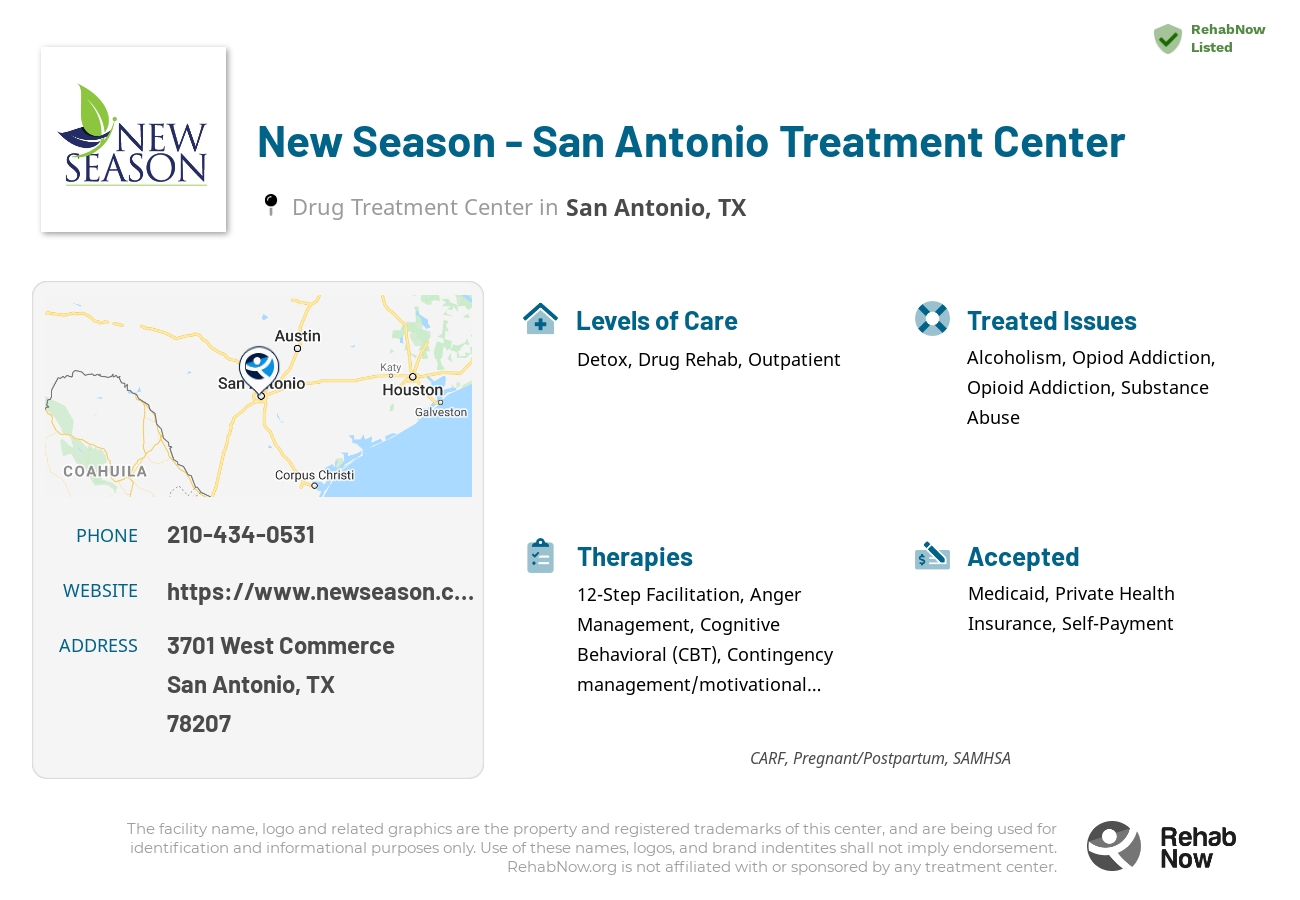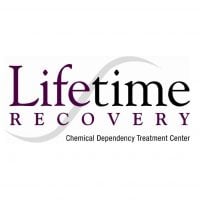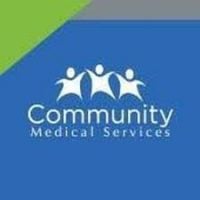New Season - San Antonio Treatment Center
Drug Rehab Center in San Antonio, Texas
San Antonio Treatment Center offers personalized addiction treatment that combines cognitive behavioral therapy, medication management, and drug rehab for issues such as alcoholism, opioid addiction, substance abuse, and drug addiction, as well as related services like aftercare and discharge planning, HIV/AIDS and hepatitis education, and substance use counseling.
About New Season - San Antonio Treatment Center in Texas
New Season Treatment Center, located in San Antonio, TX, provides comprehensive outpatient treatment for opioid addiction. The center serves San Antonio and surrounding areas, offering personalized recovery plans designed by a team of addiction specialists.
Utilizing the latest research, New Season Treatment Center aims to support each patient's journey to recovery through affordable, accessible care. The center's treatment approach is tailored to individual needs, ensuring a customized path to sobriety.
The San Antonio facility specializes in treating opioid addiction, providing a range of services to help individuals break free from dependency. The center's programs are designed to address the physical, psychological, and emotional aspects of addiction.
- Medically supervised withdrawal ensures safe, comfortable detox
- Medication-assisted treatment (MAT) aids in managing withdrawal and cravings
- Flexible outpatient program allows integration of treatment into daily life
- Individual and group counseling sessions provide therapeutic support
Accredited by SAMHSA and CARF, New Season Treatment Center offers a comprehensive approach to recovery. From medically supervised withdrawal to MAT, individual and group counseling, and addiction education, the center provides the tools and support needed for lasting sobriety. The referral system ensures access to additional resources essential for holistic recovery.
For those struggling with opioid addiction, New Season Treatment Center in San Antonio offers a path to recovery. With personalized treatment plans, a range of evidence-based therapies, and a compassionate team of specialists, the center empowers individuals to break free from addiction and build a foundation for a sober future.
Genders
Ages
Modality
Additional
Accreditations
SAMHSA

CARF
The Commission on Accreditation of Rehabilitation Facilities (CARF) is a non-profit organization that specifically accredits rehab organizations. Founded in 1966, CARF's, mission is to help service providers like rehab facilities maintain high standards of care.
Conditions and Issues Treated
Substance abuse is a severe problem that affects many people in San Antonio, TX. It is characterized by the excessive and inappropriate use of drugs, including alcohol, medications, and illicit drugs. Substance abuse can lead to physical or psychological dependence and affect social life and relationships. Treatment options include medications, counseling sessions, behavioral therapy, and group therapy. If you are suffering from substance abuse, contact for the latest treatments available.
Opioid addiction is when someone becomes addicted to opioids. This can happen quickly due to any opioid use. Opioid withdrawal can be uncomfortable and lead the user to continue using even if they want to quit. It’s best to receive inpatient treatment for detoxification.
Even if a person doesn’t need inpatient treatment, it’s recommended to start rehabilitation or at least some kind of outpatient treatment. This is because the withdrawal symptoms from opioids can be uncomfortable and unpleasant, to the point that a person could end up using again or worse.
Detoxification should be done to break the physical addiction of opioids. This can be done with opioid replacement therapy, medication-assisted therapy, or a more traditional detoxification program. Intensive outpatient treatment is a form of addiction care that allows patients to continue living at home while undergoing treatment. This type of care is appropriate for patients who have been treated in residential treatment programs. Intensive outpatient programs include regular visits to the facility providing therapy, and patients gradually return to their routine life. IOP benefits most when patients have a supportive family member or friend to help them recover.
The first step to getting into an intensive outpatient program is to attend a detoxification facility. Detoxification facilities are designed to remove substances from the body safely. The patient will attend sessions designed to help them understand their addiction and its impact on their lives. While in an intensive outpatient program, therapy sessions are scheduled three to five times per week, with the patient attending no more than two sessions in one day.
Levels of Care Offered
This center offers a variety of custom treatment tailored to individual recovery. Currently available are Aftercare Support, Detox, Drug Rehab, Outpatient, with additional therapies available as listed below.
Detox is the process by which toxins are removed from the body. In substance abuse, detox refers to the process of getting rid of the drugs that are already there in the system once the patient stops its further intake. Detox is the initial step in the recovery process. The physiological dependence on the drug over a period can lead to withdrawal symptoms.
Depending on the severity of the symptoms, the detox process is managed either medically or clinically. While Medically assisted detox relies on the usage of specific medicines, clinal or social detox relies on providing emotional and psychological support to the patient.
Outpatient treatment consists of counseling and therapy sessions. The outpatient treatment process begins with the addict’s initial detox period, lasting about ten days. Outpatient treatment is used for those who are at moderate risk for “slipping back” into the addiction. It is also used for those who are not currently experiencing any side effects from withdrawal, can handle social pressure, have a stable living environment, and have a good support system.
Aftercare support is often overlooked in the treatment of drug and alcohol addiction. However, it’s an essential part and should be considered when planning a course of rehab.
Aftercare is a term that’s used to refer to any sort of continuing care offered for a drug addict who has voluntarily entered a rehabilitation program. This type of care can be provided in several settings, including outpatient therapy sessions after the addict has completed an inpatient program. There are also 12-step support groups, such as Alcoholics Anonymous, which can provide additional help for addicts trying to stay sober.
Aftercare is vital because addicts often face many challenges as they attempt to recover from drug addiction or alcoholism. Because of the powerful nature of these addictions, those who struggle with a drug or alcohol problem will likely have to face the craving for their substance of choice for the rest of their lives. Recovering can be a lonely and frustrating endeavor, especially without the support of others who are going through similar situations.
Therapies & Programs
Individual Therapy is a crucial component of addiction recovery. Therapists work with patients to identify the root of their addiction and figure out how to better handle the issues that led to them using drugs. Individual Therapy is one on one sessions where people meet with their therapist. Individual therapy provides a safe space for people to open up and discuss personal and sensitive topics which they may not feel comfortable discussing in a group setting.
In this type of therapy, therapists can develop specific solutions for each patient, which helps speed up their recovery process. In addiction recovery, therapy is a crucial part. It allows patients to go deep into their core issues and discover how those problems can be better handled now. Therapy can be performed in individual sessions as well as group settings. In individual therapy for addiction, the patient meets with the therapist one-on-one to focus on the underlying issues of addiction and come up with solutions to prevent future abuse.
Family therapy is a crucial part of drug treatment and getting sober. It is one of the most effective ways to help addicts stay on the path to long-term sobriety. One of the most important parts of family therapy is the relapse prevention plan. During treatment, therapists and doctors will often sit down with the addict and their family to develop a plan if the addict ever feels like they want to use again. This plan should involve steps the addict and family can take together to prevent them from relapsing in the future.
An addict’s family can play a vital part in helping them to avoid relapse because they can spot the warning signs and help them get back on track before it becomes too much of a problem. Family therapy is one of the most effective ways to help addicts stay on the path to long-term sobriety.
Group Therapy is employed by drug treatment centers like New Season - San Antonio Treatment Center to provide the recovering addict with a platform to talk about their feelings and experiences. It also provides for an opportunity to learn from other addicts who have successfully overcome their addiction. It is recommended that all group members be recovering addicts for this type of therapy to work.
Cognitive Behavioral Therapy (CBT) is an approach and method in psychotherapy. New Season - San Antonio Treatment Center asks people to investigate how their thoughts, including habitual, harmful, and inaccurate ways of thinking, affect behaviors. CBT is based on the idea that rigid, inflexible ways of thinking cause people to have a limited ability to cope with stress, which leads to emotional distress.
Likewise, CBT helps people identify maladaptive behaviors and replace them with more positive behaviors. It makes you look at the way you perceive something and ask: Is this a realistic belief? CBT asks people to look at the role of behaviors and emotional responses and how they may be distressing in one’s life. The goal of CBT is to change the way people think and behave to achieve a more balanced, healthier lifestyle.
Moreover, CBT has been shown to reduce some types of anxiety disorders, depression, and symptoms related to thoughts or actions that are considered harmful.
Payment Options Accepted
For specific insurance or payment methods please contact us.
Is your insurance accepted?
Ask an expert, call (888) 674-0062
Additional Details
Specifics, location, and helpful extra information.
San Antonio, Texas 78207 Phone Number(210) 434-0531 Meta DetailsUpdated April 15, 2024
Staff Verified
New Season - San Antonio Treatment Center Patient Reviews
There are no reviews yet. Be the first one to write one.
San Antonio, Texas Addiction Information
Texas is one of the primary hubs for drug smuggling into the country. The border between Texas and Mexico is more than 1,000 miles long. More than 10 million residents use alcohol every year and more than 25% of those are minors. Alcohol and drug use has become so common in Texas that almost 15% of all deaths can be attributed to these substances.
The impact of drug addiction and abuse on the community in San Antonio, Texas, is significant. There were over 1,400 drug overdose deaths in San Antonio in 2016. 9,000 admissions to drug and alcohol treatment programs in the San Antonio area in 2017. Some of the most common include inpatient, outpatient, and residential treatment. There are also several detox facilities available in San Antonio.
Treatment in Nearby Cities
- Cedar Park, TX (86.0 mi.)
- Sugar Land, TX (175.9 mi.)
- Dilley, TX (65.1 mi.)
- Silsbee, TX (269.1 mi.)
- Tioga, TX (295.2 mi.)
Centers near New Season - San Antonio Treatment Center
The facility name, logo and brand are the property and registered trademarks of New Season - San Antonio Treatment Center, and are being used for identification and informational purposes only. Use of these names, logos and brands shall not imply endorsement. RehabNow.org is not affiliated with or sponsored by New Season - San Antonio Treatment Center.












